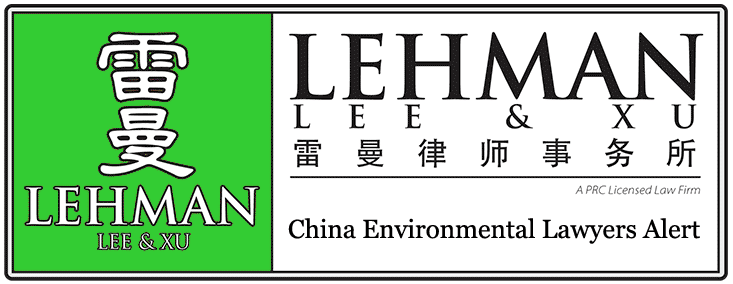
 |
|
LEHMAN, LEE & XU China Lawyers |
|
China Environmental Lawyers Alert |
|
May 2013 |
The China Law News keeps you on top of business, economic and political events in the China. |
|
|
|
In the News |
Multinational Corporations Violating China's Environmental Laws and Regulations |
Anyone wanting to do business in China, and those that are already doing business here, need to realize what “hot button” issues cleaning up and protecting the environment have become with the Chinese people, and even with government officials. China is going “green”, so the times they are a changing and everyone should take heed and act accordingly. Ignore what is happening at your own peril. This applies to everyone, big or small. Over the last three years, the Chinese government has punished 33 multinational corporations for violating the nation’s environmental laws and regulations, according to Ma Jun, director of the nongovernmental Institute of Public & Environmental Affairs. Ma’s announcement in September came as a surprise to many, as the Chinese public has tended to assume that multinational companies abide more strictly by the law than some in fact do in this heavily polluted country. The exposed companies include subsidiaries of world-renowned corporations such as American Standard, Panasonic, Pepsi, Nestle, and 3M. They were punished mainly for discharges of substandard waste water and for unauthorized construction activities that occurred in the absence of proper environmental impact assessments. When researchers at Ma’s institute began building a database to map China’s water pollution earlier this year, they used data from the websites of various Chinese environmental protection authorities. During the process, they came across a list of multinational corporations that had been cited for environmentally harmful activities for the years 2004–06. Ma, who once worked as an environmental consultant for multinationals in China, was shocked by the discovery. “Those enterprises have been talking about corporate responsibility, yet they could not even abide by the law,” he says. “On the one hand, multinational corporations have not kept their environmental promise with respect to a global uniform standard; on the other hand, the implementation power of environmental laws and regulations in China is very weak.” Mr. Zhao, an authority with the Jilin Provincial Environmental Protection Bureau agrees that, “Multinational corporations have relaxed their environmental standards in China.” And according to Lo Sze Ping, campaign director of Greenpeace China, the “words” of multinationals are often better than their deeds. To address their wrongdoings, companies are more willing to invest in public relations than in actually cleaning up the manufacturing process, he says. What concerns environmentalists more, however, is the weak governmental and legal oversight of multinational corporations. Lo observes that as local governments seek to attract foreign investment, their affiliated environmental protection bureaus dare not take strict measures to address pollution by multinational corporations. He also believes that since multinational corporations typically perform better than domestic enterprises environmentally, the sub-par activities of foreign companies won’t attract the attention of the country’s top environmental authority, the State Environmental Protection Administration. This leaves a void in supervision. William Valentino, general manager for corporate communications for Bayer Corporation and the chair of the Corporate Social Responsibility Working Group of the European Chamber of Commerce in China, agrees that the poor environmental performance of domestic enterprises should not be used as an excuse for multinationals. “Talk about home electronic appliances, Chinese people will think of Sony; talk about soft drinks, they will think of Coca Cola. As an international enterprise trusted by the Chinese people, one is obliged to bear more responsibilities,” Valentino says. http://www.worldwatch.org/node/4764 |
|
|
|
|